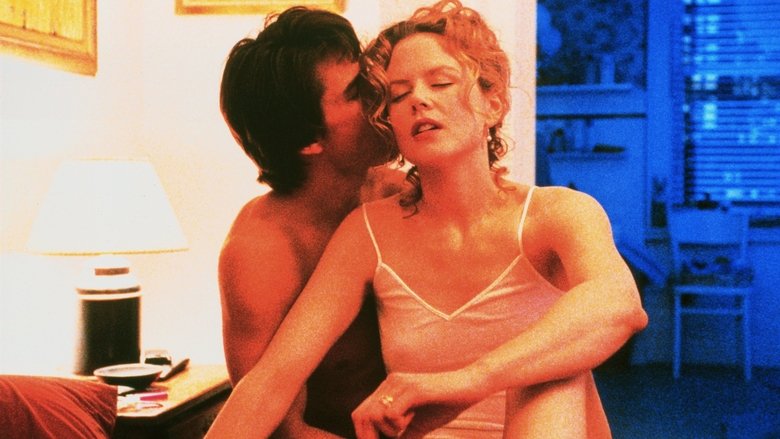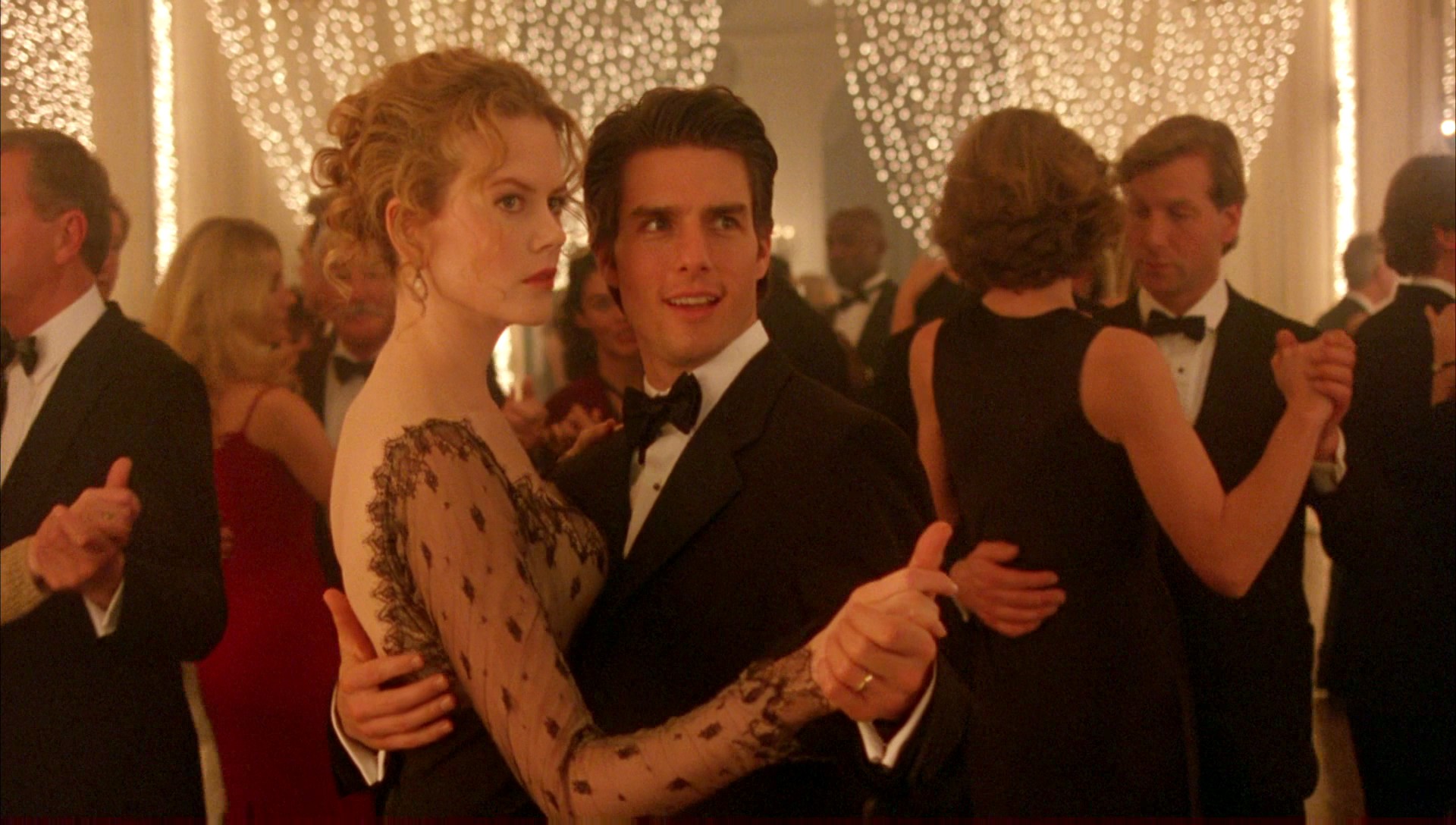← Back to Reviews

in
#415 - Eyes Wide Shut
Stanley Kubrick, 1999

After an argument with his wife about the subject of infidelity, a wealthy doctor wanders into the night and ends up having a series of bizarre encounters.
Unsurprisingly, I did not think all that much of Eyes Wide Shut when I first saw it several years ago. Even at the peak of my interest in Kubrick, I could recognise that it still had his same sense of visual mastery, but the subject matter left a lot to be desired. Clocking in a staggering 160 minutes, it ended up being one of his longest films and based around a story that was alternately sluggish and bizarre thanks to its focus on exposing the banality behind supposedly scintillating subjects such as sexuality, infidelity, and perversion. This was amidst a somewhat thriller-like plot where the situations within the film escalated from the intriguing to the dangerous. Even so, I figured that I'd give it time to breathe and return to it at a later date, and now here I am with a far more favourable opinion. In a clever bit of stunt-casting, the film stars the most famous celebrity couple of the late-90s, Tom Cruise and Nicole Kidman, as a general practitioner and his stay-at-home wife respectively. They seemingly have it all - wealth, a good home, a loving daughter, and a seemingly healthy relationship with one another - but that last one slowly gets picked apart after the duo attend a Christmas party held by one of Cruise's friends (Sydney Pollack). After they get into an argument over gendered double standards in regards to sexual thought processes and especially in regards to infidelity, Cruise decides to leave home and ends up wandering through the streets of downtown New York, having a series of increasingly surreal encounters that lead him to question virtually everything he's ever known about human nature.
I guess it's just as well that Kubrick's final film ended up being what was probably his most dense and difficult work (even in comparison to the disorienting approach to science-fiction he took with 2001). There's a superficially easy to spot plot thread thanks to Cruise's character going through a journey of curious self-discovery, but it's used as the launching pad for scenes that range from lengthy discussions about subjects outlined above to lurid scenes depicting near-incomprehensible displays of eroticism (case in point - the notorious orgy sequence full of figures wearing masks and robes). Throughout it all, Cruise makes a good choice to play a character who is as good an example of the "typical" Kubrick protagonist as you're likely to find with his charming yet hollow persona feeling like the director once again playing a lead's acting weaknesses for maximum effect (see also: Barry Lyndon). Kidman, meanwhile, does the best with what she's got but between her character being deliberately set up as an ill-tempered instigator for Cruise's narrative and the developments that are supposed to make her more complex than that it feels a bit too inconsistent in terms of quality (and it's not helped by her relative lack of screen-time). Otherwise, the cast is populated by some characters that range from the understandably bland to the unforgettably unique.
Though this is technically one of the most mundane films Kubrick ever made (there's no war or sci-fi or supernatural horror), he certainly doesn't skimp on bringing in a lot of recognisable visual trademarks, whether it's the sweeping Handicam long-takes or the way in which still shots are framed. The use of colour is very effective, especially when the colour blue is involved ever-so-slightly in a lot of the scenes (as if to reflect the sheer artificiality of these people's lives). Knowing that the film was (as with most of Kubrick's output) actually filmed in Britain makes his recreation of downtown New York stand out as an uncannily detailed one, with there being just enough changes to make it feel like the somewhat surreal dream reality that it may or may not be intended to be (though interpreting it as a dream sounds kind of boring). There is once again an interesting selection of music, whether it's the signature leitmotif that consists of an arrhythmic two-note melody playing over the most unsettling parts of the film or a typically Kubrickian mix of classical tunes. Though it's perhaps a little on the long side even for Kubrick, it's still a compelling film more often than not (and this is on a second viewing, no less) and its sheer weirdness makes it a good way for Kubrick to conclude his filmmaking career (not like he had much choice in the matter). Still not sure how it'd stack up to the rest of his films, but it'd definitely hold its own regardless.
Stanley Kubrick, 1999

After an argument with his wife about the subject of infidelity, a wealthy doctor wanders into the night and ends up having a series of bizarre encounters.
Unsurprisingly, I did not think all that much of Eyes Wide Shut when I first saw it several years ago. Even at the peak of my interest in Kubrick, I could recognise that it still had his same sense of visual mastery, but the subject matter left a lot to be desired. Clocking in a staggering 160 minutes, it ended up being one of his longest films and based around a story that was alternately sluggish and bizarre thanks to its focus on exposing the banality behind supposedly scintillating subjects such as sexuality, infidelity, and perversion. This was amidst a somewhat thriller-like plot where the situations within the film escalated from the intriguing to the dangerous. Even so, I figured that I'd give it time to breathe and return to it at a later date, and now here I am with a far more favourable opinion. In a clever bit of stunt-casting, the film stars the most famous celebrity couple of the late-90s, Tom Cruise and Nicole Kidman, as a general practitioner and his stay-at-home wife respectively. They seemingly have it all - wealth, a good home, a loving daughter, and a seemingly healthy relationship with one another - but that last one slowly gets picked apart after the duo attend a Christmas party held by one of Cruise's friends (Sydney Pollack). After they get into an argument over gendered double standards in regards to sexual thought processes and especially in regards to infidelity, Cruise decides to leave home and ends up wandering through the streets of downtown New York, having a series of increasingly surreal encounters that lead him to question virtually everything he's ever known about human nature.
I guess it's just as well that Kubrick's final film ended up being what was probably his most dense and difficult work (even in comparison to the disorienting approach to science-fiction he took with 2001). There's a superficially easy to spot plot thread thanks to Cruise's character going through a journey of curious self-discovery, but it's used as the launching pad for scenes that range from lengthy discussions about subjects outlined above to lurid scenes depicting near-incomprehensible displays of eroticism (case in point - the notorious orgy sequence full of figures wearing masks and robes). Throughout it all, Cruise makes a good choice to play a character who is as good an example of the "typical" Kubrick protagonist as you're likely to find with his charming yet hollow persona feeling like the director once again playing a lead's acting weaknesses for maximum effect (see also: Barry Lyndon). Kidman, meanwhile, does the best with what she's got but between her character being deliberately set up as an ill-tempered instigator for Cruise's narrative and the developments that are supposed to make her more complex than that it feels a bit too inconsistent in terms of quality (and it's not helped by her relative lack of screen-time). Otherwise, the cast is populated by some characters that range from the understandably bland to the unforgettably unique.
Though this is technically one of the most mundane films Kubrick ever made (there's no war or sci-fi or supernatural horror), he certainly doesn't skimp on bringing in a lot of recognisable visual trademarks, whether it's the sweeping Handicam long-takes or the way in which still shots are framed. The use of colour is very effective, especially when the colour blue is involved ever-so-slightly in a lot of the scenes (as if to reflect the sheer artificiality of these people's lives). Knowing that the film was (as with most of Kubrick's output) actually filmed in Britain makes his recreation of downtown New York stand out as an uncannily detailed one, with there being just enough changes to make it feel like the somewhat surreal dream reality that it may or may not be intended to be (though interpreting it as a dream sounds kind of boring). There is once again an interesting selection of music, whether it's the signature leitmotif that consists of an arrhythmic two-note melody playing over the most unsettling parts of the film or a typically Kubrickian mix of classical tunes. Though it's perhaps a little on the long side even for Kubrick, it's still a compelling film more often than not (and this is on a second viewing, no less) and its sheer weirdness makes it a good way for Kubrick to conclude his filmmaking career (not like he had much choice in the matter). Still not sure how it'd stack up to the rest of his films, but it'd definitely hold its own regardless.
